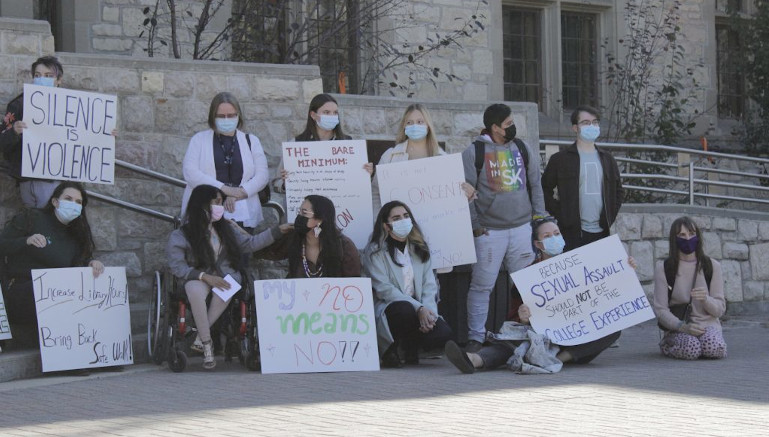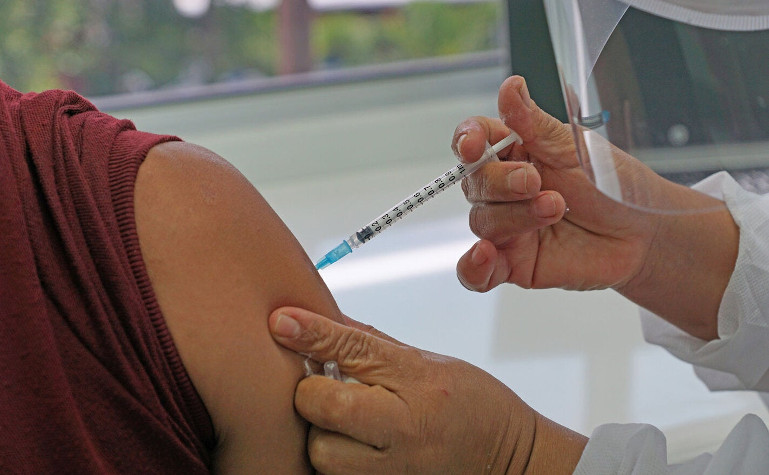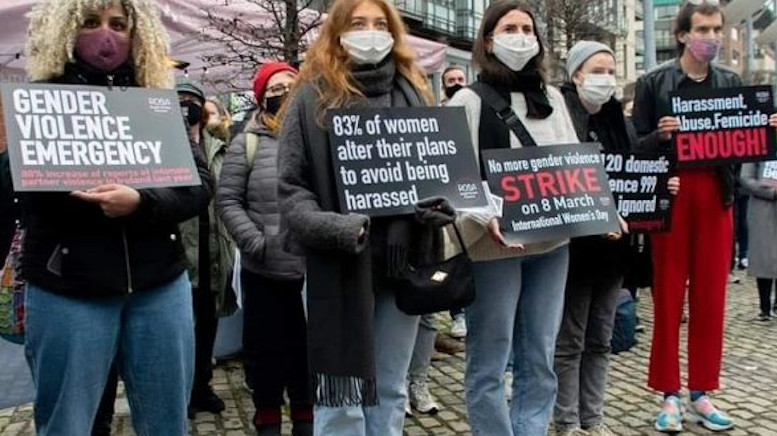On October 8, after once again University of Saskatchewan campus security failed to protect a female student from being sexually assaulted, students held a rally in Nobel Plaza holding signs such as “Silence is Violence,” “Stop Victim Blaming,” and “Consent is a Basic Human Right.” Despite the solidarity shown among Caucasian, Indigenous and Transgender students, there was not enough support from cis-gender males. The story itself was relegated to the back pages of the local paper, The Star Phoenix, and on the fifth page of the website within a week.
Third-year student, Aubrey-Anne Laliberte-Pewapisconias, one of the rally speakers, said that campus needs to be a place where it is “safe to learn, safe to study, safe to exist,” and called on supporters to stand up for the most vulnerable members of the campus community. “Being an Indigenous woman, when I leave the house at any time … my parents are worried,” she said. “I see them being scared. I see them knowing for me, being an Indigenous woman walking around, the risk is super high.”
Jaycen Jakubowksi attended the rally as a transgender man and a survivor of childhood sexual abuse. He spoke about the role of gender in sexual assaults, “as someone who is a man now, I definitely have a lot of privilege feeling more safe than a woman would,” he explained. “I’ve been out on campus after dark and I didn’t feel in danger or anything just because of my identity and how I present to other people.”
Initiative-taking ideas were proposed at the rally, such as installing more cameras and light sources on the campus for students out at night. More transparency and communication are wanted between students and campus security. This is only a band aid to cover up a much larger wound. The University’s Student Union and the administration plan to meet, but given the history of assaults at Canadian universities, the future does not look promising. Figures from Statistics Canada published in 2020 show that nearly three-quarters of university students in Canada “witnessed or experienced unwanted sexualized behaviours in a post-secondary setting in 2019 ─ either on campus, or in an off-campus situation that involved students or other people associated with the school.”
Due to this rising tide of young women coming forward, assisted by the #metoo movement that has spanned the globe, provinces have enacted legislation, starting with the 2016 Sexual Violence and Harassment Action Plan enacted in Ontario. Manitoba, Nova Scotia, and Québec brought in similar versions of this law. Saskatchewan does not have its own version of this law. But does it work? No. MacLean’s published an article, coincidentally, on October 4 that exposes any theory of transparency is a myth.
Karen Busby, a University of Manitoba law professor, who collected information for a paper on the reporting process, found that “there’s almost nothing known about those processes.” “There’s nothing transparent about them, there’s nothing written about them, and they’re not reported. We don’t know how many complaints are made,” she says. “We don’t know how many are investigated. We do not know who is doing the investigation. And we do not know what the outcomes are.”
Michelle Roy, who sparked protests at Mount Allison University in Sackville, N.B. after holding a sign reading, “Mount Allison silences victims” in her graduation photos, states that when she came forward with accounts of sexual harassment and assault, school officials “encouraged” her to make an informal, verbal disclosure. She and other students were told that if they wished to make a formal, written complaint in the hope of a more thorough investigation that “We were mostly [given] scare tactics, like, ‘We can protect you if you make [an informal] disclosure. If you file a complaint, the person will know your name.’”
And why do the executive leadership care about transparency? Universities are big business and integral in training the next wave of politicians and civil servants that keep the gears of capitalism turning. Tuition at the University of Saskatchewan for direct entry, on average $7,000 a year ($20,000 for international students), however the non-direct entry courses, (meaning specific required university level courses that must be completed beforehand) will cost $15,651 ($46,953 international) a year for Law, $18,718 for Pharmacy and a whopping $37,838 a year for Dentistry! Notice a pattern emerging? The most repressed in society, the Indigenous population, would first have to fight through the systemic racism in Saskatoon to even get accepted.
What about student loans you say? Doesn’t that bridge the disparity? As someone who took their undergraduate degree in the UK, I can tell you first-hand, they are like any other loan company and Lord save you if you miss a payment. You get cold called repeatedly and have to prove “extraordinary circumstances” to lower your payments. In Saskatchewan, the situation seems even worse with friends telling me all about their “crippling loan payments.”
As socialist feminists, we believe that the oppression of women, LGBTQ+ and the Indigenous communities is rooted in capitalist society. Unlike liberal feminists who believe that all cis-gender men benefit from sexual assault, we believe that all working people suffer from these vile acts, ensuring a wedge is formed between the sexes hampering the chance of unity against the real enemy.
As Irish Socialist Party member (ISA in Ireland) Aislinn O’Keeffe stated at a ROSA protest in Limerick on June 15, “This system perpetuates misogyny, a macho culture, victim blaming and violence. We need systemic change, but even with COVID, we must be able to demand gender violence is made a political priority with education throughout society, proper resourcing for rape crisis centres and refuges and a radical overhaul of the legal system which has multiple barriers to pursuing abusers.”
We have no confidence in Trudeau’s federal government or the province’s right-wing Saskatchewan Party of Premier Scott Moe to root out these inequalities.
As Socialist Feminists we demand:
- An immediate public investigation into all current and historical sexual assault crimes on Canada’s university and college campuses. This should involve survivors and be chaired by a democratically elected student body.
- The rights of all Indigenous groups to be respected
- No trust in the private security companies. Students to organize and begin their own self defence organizations with particular emphasis on young women, transgender, and Indigenous groups.
- Finally, all courses should be free with state supported grants.




